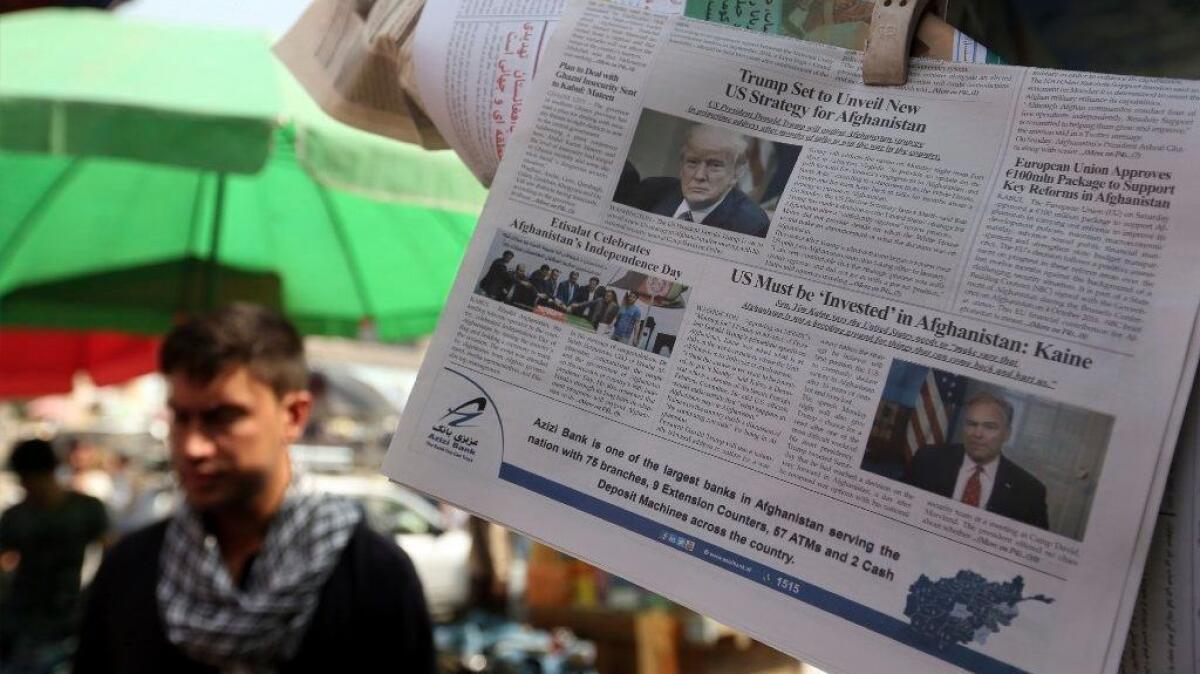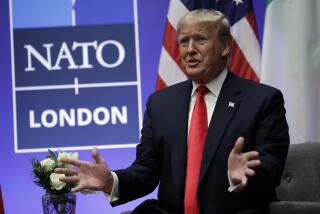Pakistan finds itself on the defensive in Trumpâs Afghan war strategy

Eliminating timetables, increasing reliance on India and Pakistan and updating the tools and rules of engagement. (Aug. 22, 2017) (Sign up for our free video newsletter here http://bit.ly/2n6VKPR)
Reporting from Islamabad, Pakistan â It feels like a lifetime ago, but it was just December, a week after his election, that then-President-elect Trump was lavishing praise on Pakistan, calling it a âfantastic place ... doing amazing work.â
But as Trump said in outlining his new strategy in South Asia, things look different from behind a desk in the Oval Office, and his views toward Pakistan seem to have changed since that strange phone call with former Prime Minister Nawaz Sharif.
Sharif is gone, having resigned last month in the wake of a corruption scandal, leaving Pakistanâs military as unquestionably the most powerful force in the country. But that military â one of the United Statesâ most troublesome allies and the recipient of billions of dollars in U.S. aid â now finds itself on the defensive as Trump demands it âchange immediatelyâ its policy of harboring the Taliban and other militant groups carrying out attacks in Afghanistan.
Trumpâs tough talk signaled a possible shift as the U.S. tries to restart its failing 16-year war in Afghanistan. Many Afghans on Tuesday praised Trumpâs blunt assessment of Pakistan and expressed hope that more American troops could reverse Taliban insurgentsâ momentum and stem the mounting casualties suffered by Afghan security forces and civilians.
With the Taliban holding more territory than at any point since the U.S.-led invasion in 2001, Trumpâs announcement of a âfight to winâ strategy â though lacking in specifics â soothed Afghans who worried the United States was abandoning its longest war as it had settled into a bloody stalemate.
âI am grateful to President Trump and the American people for this affirmation of support for our efforts to achieve self-reliance and for our joint struggle to rid the region from the threat of terrorism,â Afghan President Ashraf Ghani said in a statement.
âThe Afghan government welcomes renewed U.S. emphasis on seeing security in Afghanistan as part of a wider regional package.â
Pakistan scrambled to respond to the criticism. Foreign Minister Khawaja Asif met with the U.S. ambassador in Islamabad and âunderlined Pakistanâs continued desire to work with the international community to eliminate the menace of terrorism.â
Late Tuesday, following a two-hour Cabinet meeting, Pakistanâs government issued a statement saying it had âtaken noteâ of Trumpâs Monday night address and rejected his âfalse narrativeâ that it provided safe havens to militant groups.
âNo country in the world has done more than Pakistan to counter the menace of terrorism. No country in the world has suffered more than Pakistan from the scourge of terrorism, often perpetrated from outside our borders,â the statement said.
âIt is therefore disappointing that the U.S. policy statement ignores the enormous sacrifices rendered by the Pakistani nation in this effort.â
Pakistani officials were particularly stung by Trumpâs embrace of its rival India, which the U.S. has not often included in its Afghan strategy despite its being the largest country in the region.
Trump âhas given a negative message to Pakistan,â said Sherry Rehman, a Pakistani lawmaker and former ambassador to Washington. âThe best possible way forward is to promote peace and harmony in the region instead of dividing Pakistan and India.â
Opposition leader Imran Khan lashed out on Twitter, saying Pakistan had lost tens of thousands of lives to terrorism and was âbeing made scapegoats for the policy failures of the U.S. and India.â
Pakistanâs military â which denies allegations that it nurtures terror groups who attack India and Afghanistan â appeared to anticipate Trumpâs criticism, holding a news conference on Monday to trumpet the success of Zarb-e-Azb, a years-long operation involving around 200,000 troops to eliminate militant havens in the northern tribal areas.
In between slides showing statistics â officials say around 3,500 militants have been killed and thousands arrested â the military played short films set to dramatic music showing Pakistani troops in the remote region.
Pakistan has carried out dozens of such offensives and been accused of picking and choosing which militant groups it confronts. The Haqqani network, which U.S. officials blame for some of the deadliest attacks against its forces in Afghanistan, has largely escaped the effect of more than a decade of Pakistani military operations.
But Pakistani officials insist this time is different. They argue that terrorism-related deaths in Pakistan have fallen by about half since 2014. They blame several high-profile terror attacks on militants who, they say, enjoy safe havens in Afghanistan and the backing of Indian intelligence agencies.
âA militant resurgence is now out of the question,â Pakistani military spokesman Maj. Gen. Asif Ghafoor told reporters Tuesday. âThey want to regain lost influence, but it wonât happen. Itâs too late for that.â
Congress already has reduced funding for the Pakistani army and denied it the chance to purchase U.S.-made F-16 fighter jets at subsidized prices. But because U.S. strategic planners fear that Pakistanâs nuclear weapons could fall into the hands of militants, Washington has been reluctant to exert too much pressure on the Pakistani security establishment.
âAnyone who thinks this shift in Pakistan strategy will be easy to implement, remember: Pakistan negotiates with a gun to its own head,â tweeted Vipin Narang, an MIT political science professor who studies South Asia.
Many Afghans said they hoped U.S. pressure would force Pakistan to bring Taliban leaders to the negotiating table and curtail their ability to direct attacks from across the border.
âI believe the U.S. has seen Pakistan in a better light than Afghanistan, so I would be optimistic and support the new strategy of the United States if it implements it honestly,â said Nasir Karimi, a 22-year-old psychology student at Kabul University.
âStill,â Karimi added, âI canât trust that the U.S. will be honest.â
Afghansâ wariness is rooted in a history of U.S. inconsistency in the country. U.S. forces quickly ousted the Taliban government from power in Afghanistan following the Sept. 11 terrorist attacks but then diverted troops and focus to the Iraq war, allowing Taliban fighters to stream back into the country.
President Obama announced a troop surge in 2009 but, in the view of many Afghans, undermined the strategy by setting a withdrawal deadline that reassured the Taliban that it could simply lie in wait. Trump, too, once advocated for bringing all U.S. troops home before saying in his Monday night address that he had changed his mind after months of consultations with Cabinet and military officials.

As the U.S. troop presence dwindled from more than 100,000 to 8,400 today, the Taliban have regained control of large chunks of northern and southern Afghanistan while the government holds just 60 percent of the countryâs 407 districts, according to the most recent assessment by the Special Inspector General for Afghanistan Reconstruction.
Trump did not specify how many additional U.S. troops would be deployed, but Pentagon officials have said the number is expected to be about 4,000. They will be focused on âkilling terrorists,â Trump said, including the Taliban, Islamic State loyalists and remnants of Al Qaeda.
âPresident Trump has embraced a strategy that gives Afghanistan what it needs,â said the Afghan ambassador to Washington, Hamdullah Mohib, including âa shift away from talking about timetables and numbers to letting conditions on the ground determine military strategy.â
In his speech, Trump said 20 organizations designated by the United States as terrorist groups are active in Afghanistan and Pakistan, âthe highest concentration in any region anywhere in the world.â Some observers noted that neither country is subject to Trumpâs travel ban on citizens from countries deemed prone to terrorism.
Trumpâs speech provoked mixed reactions in India, where officials welcomed the promise to be tougher on Pakistan but questioned his call for New Delhi to play a greater role in building Afghanistanâs economy.
The Indian foreign ministry issued a statement saying India âhas been steadfast in extending reconstruction and development assistance to Afghanistan,â which has included hundreds of millions of dollars in aid and constructing a new parliament building.
And Indian analysts chafed at Trumpâs reference to the U.S. trade deficit with India when he said that because âIndia makes billions of dollars in trade with the United States,â it should âhelp us more with Afghanistan.â Indian investment in Afghanistan is based on its own regional security and should not be tied to demands from Washington, said Kabir Taneja, associate fellow at Observer Research Foundation in New Delhi.
âI think President Trump needs to understand, or someone needs to explain to him, that everything cannot be equated to trade data,â Taneja said.
âNew Delhi does not act at Americaâs behest on its Afghanistan policy. It knows better,â he added. âAttaching possibilities of better joint cooperation over security in Afghanistan to some sort of trade [spreadsheet] is a self-defeating act for Washington.â
Special correspondent Sahi reported from Islamabad and Times staff writer Bengali from New Delhi. Special correspondents Sultan Faizy in Kabul, Afghanistan, and Umar Farooq in Islamabad contributed to this report.
More to Read
Sign up for Essential California
The most important California stories and recommendations in your inbox every morning.
You may occasionally receive promotional content from the Los Angeles Times.











